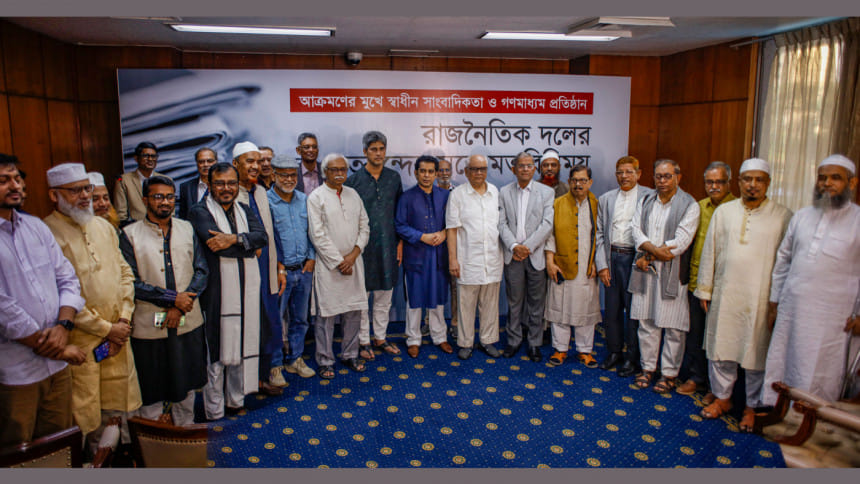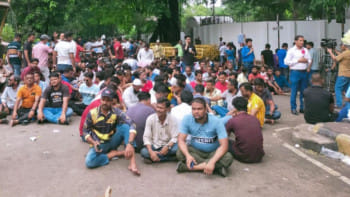Political parties strongly endorse press freedom

Political parties yesterday expressed their unwavering support for press freedom, highlighting its vital role in strengthening democracy and securing the nation's future.
They blasted the recent attacks on the press and called for an immediate end to such activities. They also cautioned that if such activities go on, the aspirations of the July uprising would not be fulfilled.
Top leaders of 13 political parties made these remarks at a views-exchange meeting on "Independent Journalism and Media Institutions Under Threat".
The Newspaper Owners' Association of Bangladesh (Noab) organised the programme at the Pan Pacific Sonargaon Hotel.
Speaking at the event, BNP Secretary General Mirza Fakhrul Islam Alamgir said it is quite unfortunate that he had to discuss press freedom in a free environment after the fall of a fascist regime.
"Over the last 15 years, people, including political activists, had been in constant fear of being sued or landing in jail for writing in newspapers or speaking out. It is unfortunate that even after a mass uprising, attacks on media outlets remain a concern," he said.
He said the BNP always fought for freedom of speech, right to vote, and democracy.
"Some people are attempting to divide the people. Certain remarks are being made that could lead to complete anarchy. Together, we must stop this; or else, the sacrifices of the students and the masses will go in vain."
Fakhrul pointed out that certain actions lead to depoliticisation at times, which must be consciously avoided. He said that an elected government is the best option, but imposing control on it or on democracy is unacceptable.
"Creating anarchy or acting recklessly would lead the nation towards the gravest danger."
Urging caution, he warned against taking actions that could allow the ousted prime minister Sheikh Hasina to manipulate incidents from abroad and this would ultimately spoil the opportunity to rebuild the nation.
He reaffirmed his party's commitment to protect freedom of the press, freedom of expression, and voting rights at all costs.
Andaleeve Rahman Partho, chairman of Bangladesh Jatiya Party, said it is not unlikely that press freedom would be under threat after the fall of such a fascist regime.
He said that when the interim government assumed office on August 8, the media outlets had said that the government should stay in power for two to three years. "They also said there is no difference between an Awami League government and that of the BNP's, and that the two parties are two sides of the same coin. This view of the media hurts us."
Partho said no one should think that if one government is replaced by another one, nothing will change. "Thinking along such line is another form of fascism."
"It is ultimately up to the people to decide. A gap has been created between political parties, the government, and the media. Many have tried to capitalise on this gap."
He also said the interim government has failed to keep in touch with the people.
"Had the government maintained more matured informal and formal relationships with the political parties, these problems would not have arisen."
Terming the incumbent government a weak government, Partho said no one can expect they would be protected by such a weak administration.
"Only a people's government, be it good or bad, can be held accountable. A political government can stand by the media and protect it."
Hamidur Rahman, assistant secretary general of Jamaat-e-Islami, said democracy and independent journalism are intrinsically linked.
He said his party thinks any attempt to weaken independent journalism is a conspiracy to undermine the state.
"Such actions constitute a new conspiracy aimed at obstructing the path of democracy and paving the way for the return of old fascism."
Highlighting Jamaat's continued support for independent journalism, Hamidur said, "Arson and other attacks and vandalism targeting newspaper offices are regrettable. We do not support such activities."
He called for a national consensus to address any such crisis.
Nagorik Oikya President Mahmudur Rahman Manna said, "When you talk about practising inclusive politics and democracy, you will also have to accept the idea of letting a hundred flowers to bloom. You cannot gag any opinion. Democracy is undoubtedly the rule of the majority, but at the same time, you must also acknowledge you cannot muzzle the minority communities."
He said every opinion must be allowed to be expressed.
"From this perspective, I believe that be it the Prothom Alo, The Daily Star, or any other newspaper or TV channel, they must be granted full freedom. If we cannot foster the expression of diverse opinions freely, it will be difficult for us to move forward."
Zonayed Saki, chief coordinator of Ganosamhati Andolon, said press freedom was the "key verdict" of the 1971 Liberation War and the 2024 mass uprising.
"For that, we need to stand for the media and its rights. Even if a media outlet is ideologically opposed to me, I will stand for its rights as well."
He said he believes there should be one standard for everyone.
"Even if we do not consider a particular media outlet ideologically correct, it still has the right to exist as a media entity. Ideological and political debates will continue, but committing a nuisance in front of a newspaper office aligns with fascist practices. Shutting a media outlet is an extension of this approach, and everyone should realise this."
Saki said there can be criticisms, and ideological differences among the people, but their freedom of speech should not be obstructed by any means.
"These issues should be clearly mentioned in the constitution in future."
There should be no compromise on press freedom because people rely on the media, he added.
Nasiruddin Patwary, convener of the Jatiya Nagorik Committee, called for unity among the stakeholders to resolve the problems facing the media through dialogue.
"Those who have resentment or complaints about any particular media outlet can resolve those issues through discussions," he said.
Nasir urged the media owners, workers, political figures, and all other stakeholders to come to a common platform so that no media house in the country would fall victim to aggression.
"Wherever there is an attack, we will collectively stand against it," he added.
Bazlur Rashid Firoz, general secretary of Bangladesh Samajtantrik Dal, said attacks on newspapers and media outlets are effectively assaults on democracy and the mass uprising of 2024. "To counter these attacks, we must unite and move forward collectively."
Saiful Haque, general secretary of Biplobi Workers Party, described the slaughter of a cow for a feast in front of a newspaper office as an unbelievable, unimaginable and worrying act.
Condemning the incident, he said, "The question of who was behind this remains unaddressed. Who will uncover this? There must be provocation and instigation behind it."
Communist Party of Bangladesh General Secretary Ruhin Hossain Prince criticised the arbitrary cancellation of the accreditation cards of some journalists and filing of murder cases against some others.
He said people must stand united against the attacks on the media.
Rashed Khan, general secretary of Gono Odhikar Parishad, said his party strongly believes in freedom of speech and freedom of press.
"If the journalists cannot write independently even after the mass uprising, it would be deeply saddening."
He said the media did not play its due role over the past 15 years, and the authorities should investigate into this failure.
Mujibur Rahman Manju, member secretary of Amar Bangladesh (AB) Party, highlighted a "gap" between the media stakeholders and those protesting against some media outlets.
"It was the government's responsibility to engage with the demonstrators outside the Prothom Alo office. What could have been resolved through discussion has instead been allowed to evolve into an ideological or commercial issue."
Manju suggested that the Media Reform Commission or the Noab make recommendations to prevent such incidents.
Maulana Imtiaz Alam, assistant secretary general of Islami Andolan Bangladesh, said, "We believe in freedom of the media and we want to assist them. However, the media also need to make sure it do not write or say anything that goes against the belief of the majority. The media also need to show respect to our belief."
Jalaluddin Ahmed, joint secretary general of Bangladesh Khelafat Majlish, urged the owners of media outlets not to discriminate between political parties while running news on them.
Reading out a written statement, Noab President AK Azad expressed deep concern that at a time when media outlets should be operating in a pressure-free environment after the mass uprising, some newspapers and media houses are still facing threats, and even warnings of closure.
He said incidents such as laying siege to newspaper offices in the name of protests, creating chaos, attacking regional offices, and obstructing the distribution of newspapers in different parts of the country are totally unacceptable.
These actions are fostering an atmosphere of fear and intimidation, posing a serious threat to press freedom, he said.
"The actions and campaigns against the Prothom Alo and The Daily Star are not merely protests or expression of dissent, rather those involve issuing threats, making provocative statements, spreading hatred, creating chaos outside their offices, and resorting to violence whenever possible. Such actions are causing financial losses to the newspaper industry."
Azad stressed the need for taking strong measures against such undemocratic activities that threaten press freedom.
He said the safety of the media outlets and their employees must be ensured at all costs.
The Noab leader called upon all political parties to assist and cooperate with the media to safeguard press freedom.
Mahfuz Anam, executive member of Noab and also the president of the Editors' Council, said the media want to see an end to the oppressive measures taken to suppress independent journalism and stifle the press over the last 15 years.
He said the media had hoped that the situation would improve after the mass uprising, allowing journalists to carry out their duties freely and independently.
"Unfortunately, independent journalism is being attacked in new ways, which is highly condemnable and alarming. We believe political parties play a significant role in supporting independent journalism," said Anam, also the editor and publisher of The Daily Star.
He urged political parties to ensure press freedom.
Muntasir Ali, joint secretary general of Khelafat Majlish, also spoke at the event.
Khalekuzzaman, adviser of Basod; Maj (retd) Abdul Wahab, convener of AB Party; Jahangir Hossain, senior joint secretary general of Khelafat Majlish, and its Joint Secretary General Mahabubul Haque; and Abdul Kaiyum, central publicity affairs secretary of Islami Andolan Bangladesh, were present at the meeting, moderated by Dewan Hanif Mahmud, editor and publisher of daily Bonik Barta.
Shahidullah Khan Badal, Noab vice-president and publisher of New Age; Matiur Rahman, editor and publisher of Prothom Alo; Nurul Kabir, editor of New Age; Altamash Kabir, editor of Dainik Sangbad; Saiful Alam, editor of daily Jugantor; Shamsul Haque Zahid, editor of Financial Express; Mozammel Haque, editor of daily Karatoa; and Mostafa Mamun, editor of Desh Rupantar, were also present.

 For all latest news, follow The Daily Star's Google News channel.
For all latest news, follow The Daily Star's Google News channel. 



Comments